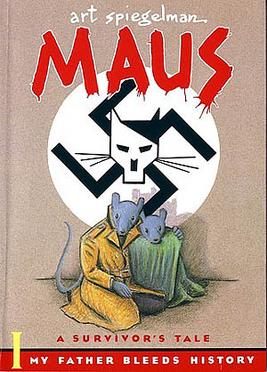‘Maus’: Holocaust story banned by Tennessee school district

The cover of “Maus,” which was recently banned by the McMinn County Schoolboard.
As reported by the Associated Press, the McMinn County Schoolboard voted 10-0 to remove the graphic novel “Maus” by Art Spiegelman from its curriculum on Jan.10. “Maus” centers around Vladek Spiegelman — a Jewish survivor of the Nazi occupation of Europe and ensuing Holocaust — and his son, who through the novel’s progression comes to know the extent of his father’s story as a victim of the Holocaust.
A main story-telling mechanism in the novel is the depiction of characters as animals. In the novel, the Germans and Nazis are presented as cats, the Jews as mice, Americans as dogs, Poles as pigs, French as frogs, Swedes deer and English as fish. The novel features depiction of murder, suicide, violence, a small drawing of a nude woman depicted as a mouse and what the McMinn County Schoolboard labeled as “rough language.”
“It shows people hanging, it shows them killing kids,” said Tony Allman, McMinn County School Board Member. “Why does the educational system promote this kind of stuff? It is not wise or healthy.”
The answer to Allman’s question is that the Nazis and their collaborators hung, gassed, shot and otherwise systematically murdered approximately six millions Jews — children and other groups included— from Germany and their occupied territories. Such violence was perpetrated against victims of the Holocaust by the Nazis and their supporters — who largely both knew about the Holocaust and did nothing to stop it — because the Nazis believed non-members of the “Aryan” race were biologically inferior and sub-human, warranting extermination.
On Jan. 10, the McMinn County Schoolboard engaged in censorship when they banned “Maus” — an approved part of the state educational program — and revoked the ability of students to experience and interpret the content of “Maus” in the official capacity of public education.
As I have argued previously, removing access to historical information, whether it be a statue or a book — however otherwise available for purchase in one’s capacity as a private citizen — has no limiting principle. The issue for me is whether the McMinn County Schoolboard is acting acceptably given it’s part of a public institution.
How sustainable a social and political precedent is restricting access to a book or information within a community’s public education system? I concede to the opposing argument that if government is to be administered based on specific cultural or social beliefs, that local government is the best way to do so. Thus a community’s beliefs may be most readily and plurally represented, although there are exceptions to this in population centers with a high amount of cultural or political diversity. The seemingly unanswerable question is whether freedom of information and speech should override a local government’s decisions of governance.
I don’t believe books should be “banned” in the realm of public education. Exclusion based on the formulative selection process of a state-level educational curriculum is understandable. The McMinn County Schoolboard banning “Maus” based on a subjective measure of “inappropriate language,” a small illustration of a nude mouse-woman, and depictions of the Holocaust that are too realistic is markedly different.
The violence of the Nazi occupation of Europe and the genocide of the Holocaust should not be softened or sugar coated. Information regarding this — and all historical events, information gathering permitting — must be readily accessible in both the public and private spheres.
Public education is already lacking in areas of substance and competent administration, to no fault of the classroom instructors who do their jobs and teach. Let us not deprive them of such a valuable instructional tool as “Maus.”







